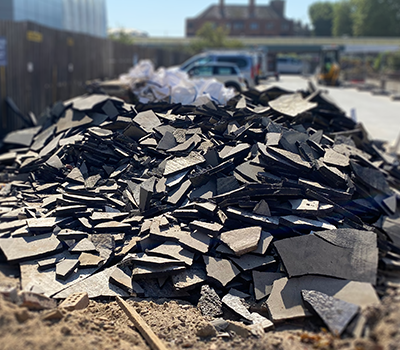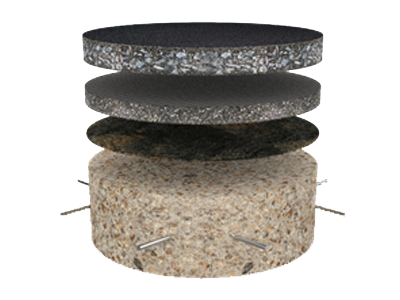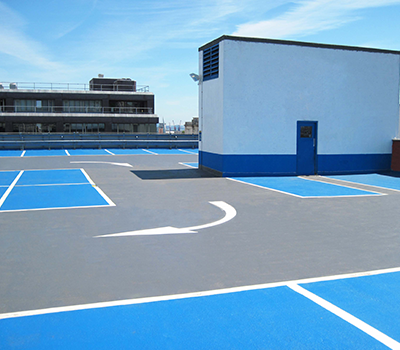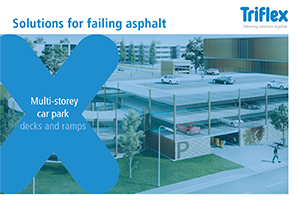Asphalt has been used for car park deck waterproofing, surfacing and protection over many years. There comes a time when asphalt deteriorates to such an extent that action is needed. Water ingress and resultant structural damage can quickly escalate in parking environments due to chloride attack and carbonation.
Temporary patch repairs may hold back issues in the short-term but a holistic solution for long term protection must follow. The seasonal effects of temperature variations, snow, and rainfall together with increasingly extremes of weather due to climate change, will exacerbate any failings in the structural protection.
Whilst a first thought may be to strip and replace asphalt coverings, there is another way. Here Richard Bowyer, Triflex National Sales Manager and Vice Chair for the British Parking Association’s Parking Structures Group, considers the sustainable benefits of overlaying existing, failed asphalt coverings.
You can also download our full guide 'Solutions for failing asphalt: multi-storey car parks' here.
Avoiding removal of asphalt and impact on structural loads
There are important considerations to take when removing asphalt from roof top parking environments. Structural loadings are calculated as part of the engineering design and specification for the car park construction. A typical 40mm asphalt build-up imposes a c.a. 100Kg/m² load. For a 5,000m² car park deck this equates to approximately 500 tons. The impact of removal of this weight on the structure must always be considered.
Structures can exhibit elastic recovery or decompression following long term dead load removal. This movement or ‘springing’ can lead to new, unforeseen cracking in the concrete deck and a potential weakening of structural integrity. By leaving the asphalt in situ, you can avoid these potential risks.
Sustainability and cost-effective reuse
Whilst asphalt can be recycled, it’s far better to move up the waste hierarchy with solutions that reuse existing materials. By leaving asphalt in place, the sustainability profile of the project is raised. And without the need to remove and recycle tonnes of asphalt, the program of works is reduced. So, by simply overlaying the existing asphalt coverings with a compatible system, disruption to operation and income generation is minimised.
Asphalt involves hot works with materials heated to very high temperatures, generally above 200oC. This not only has an impact for energy use in construction, but also safety considerations for its transportation, workforce and those in an around site. This is especially pertinent in city centres, where management of traffic and access to and from site can be challenging.
Of course, some asphalt repair may be necessary. This can be quickly and effectively achieved with cold applied PMMA-based repair products, that are fully cured in an hour. It is far more efficient to locally repair defects and overlay, rather than rip up the asphalt and start again.
Assessing the substrate suitability for overlay
Exposed decks are subject to extreme variations in temperature from approaching -15°C to +40°C across much of the UK. This results in high levels of thermally induced movement in the asphalt coverings, leading to cracking and opening of day joints.
Surveying and testing the existing asphalt build up identifies any unseen areas for repair and ensures suitability for overlay. This is achieved by core testing, where multiple samples of the asphalt are extracted, examined, and assessed. Cores show the condition of the asphalt, thickness of the various layers, size, and distribution of aggregates, as well as any separating membrane. It can also highlight points of concern such as where large aggregate has sunk, due to elevated temperatures during the original installation. With often large expanses of asphalt involved, core sampling needs to be extensive, representative of the whole area, and include any obvious defects.
Understanding the innate condition of the existing asphalt build-up ensures the correct solution. Not only are areas of repair identified, but the resulting bespoke specification will meet the highest standards for durability and confidence.
Year-round programme of works
Car parks are hardworking structures. They deliver a service and generate income as long as they are open.
Overlaying failed asphalt coverings with a proven PMMA-based waterproofing and surfacing system delivers ultra-rapid protection even at low temperatures. With Triflex PMMA systems validated for use down to 0°C, or even -5°C for details, winter weather is no longer restrictive to any program of works.
Movement considerations
Whilst every structure is different, working with an experienced team who really understand car parks and in particular asphalt substrates, will ensure the right surface protection system for your structure. Systems that have been tried and tested to manage common problems associated with structural movement should be a must.
Proven solutions for longevity
Choosing an overlay system with proven longevity is of great benefit. Recognised certification, such as BBA (British Board of Agrément) certification with a service life in excess of 15 years delivers peace of mind. Look for a supplier with a proven track record, demonstrable expertise and financial stability, as well as a meaningful manufacturer’s warranty backed by insurance.
An increasingly important advantage of a quality PMMA-based system is that not only are they robust enough to withstand wear in these most demanding of conditions, but they can be overlaid again, even some 20 years later.
Next time you require repairs to your asphalted car park, consider sustainable options for overlay.
For more information, expert advice, survey, and sustainable solutions contact us today.





